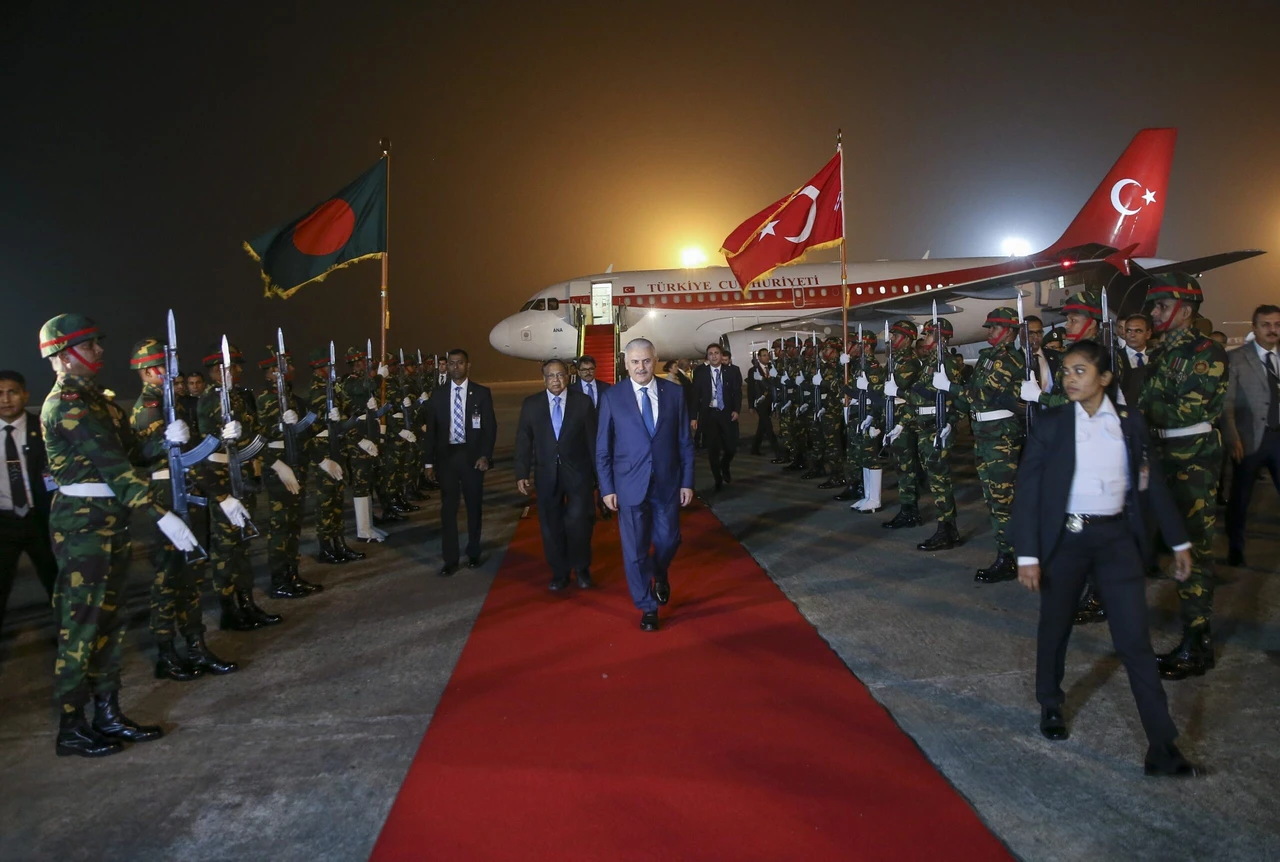Türkiye’s strategic opportunity in Bangladesh: A counterbalance to India’s Armenia gambit
 Relations between the Turkish and Bangladeshi people dates back to Ottoman times. On the photo, then Prime Minister of Türkiye Binali Yildirim (C) is welcomed with an official ceremony at Shahjalal International Airport in Dhaka, Bangladesh on December 18, 2017. (Photo AA)
Relations between the Turkish and Bangladeshi people dates back to Ottoman times. On the photo, then Prime Minister of Türkiye Binali Yildirim (C) is welcomed with an official ceremony at Shahjalal International Airport in Dhaka, Bangladesh on December 18, 2017. (Photo AA)
The evolving geopolitical landscape of South Asia and the Caucasus presents an opportunity for Türkiye to recalibrate its foreign policy in response to India’s growing alignment with Armenia. As New Delhi strengthens its defense and economic ties with Yerevan, Ankara must assess the broader implications and consider strategic engagements that reinforce its own regional influence.
A potential counterbalance lies in Bangladesh, a country of increasing geopolitical importance in South Asia. By deepening security, economic, and cultural ties with Dhaka, Ankara can expand its strategic reach and respond effectively to India’s moves in the South Caucasus.
India’s strategic expansion
India’s growing relationship with Armenia is a strategic maneuver that extends beyond defense cooperation, aiming to bolster its influence in the geopolitically significant South Caucasus. While this partnership enhances New Delhi’s regional leverage, it also presents a challenge to Türkiye’s established alliances and interests in the region. To effectively counterbalance India’s actions, the Turkish administration must strategically pivot toward South Asia, with Bangladesh offering a particularly advantageous opportunity.
Türkiye has long maintained strong ties with Azerbaijan, supporting Baku diplomatically and militarily, particularly during the Nagorno-Karabakh conflicts. India’s deepening defense ties with Armenia—evident through substantial arms deals including the Akash-1S air defense system and Pinaka multi-barrel rocket launchers—pose a direct challenge to the nation’s influence.
This week, the sale of Pinaka systems—which had never been exported outside of Armenia—to Greece, and even the possibility of joint production, made headlines in the Greek media. Athens has the American HIMARS as an alternative, which offers deterrence against potential threats from the sea by deploying these missiles on islands and coastal regions, or by neutralizing enemy units and armored vehicles over large areas. However, these alternatives come at almost half the cost.
New Delhi’s engagement with Yerevan is not merely transactional but part of a broader strategy to assert its presence in a region where Turkish and Pakistani alliances have historically dominated. Ankara must recognize this move as part of a larger geopolitical chessboard and respond with equal strategic foresight.
Why Bangladesh? Rationale for Türkiye’s move
A viable counter-move for the Turkish government involves enhancing its partnership with Bangladesh, a country with growing strategic importance in South Asia. As a rapidly developing nation with significant geopolitical clout in the Bay of Bengal, Bangladesh offers Türkiye a pathway to extend its influence into the Indo-Pacific. More importantly, deepening ties with Dhaka could give Ankara leverage against India, presenting a balance of power in a region where New Delhi has traditionally held sway.
The country has an opportunity in light of the new political developments in Bangladesh.
Selcuk Colakoglu, founder of the Asia-Pacific Center in Ankara and a faculty member at Hankuk University of Foreign Studies (HUFS), highlights the shifting dynamics in Bangladesh-India relations. “During Sheikh Hasina’s tenure, Bangladesh maintained close political ties with India. However, after her ousting, relations between Dhaka and New Delhi significantly deteriorated,” Colakoglu explains.
He points out that the transitional government’s pressure on India to extradite Sheikh Hasina further strained bilateral ties. “As economic relations with India waned, Interim Government President Muhammad Yunus accelerated efforts to diversify Bangladesh’s international partnerships. Additionally, there was a notable thaw in the long-frosty relations with Pakistan, leading to new avenues of cooperation, including the resumption of direct flights,” Colakoglu adds.

Türkiye’s opportunity ranges from internal advantages, such as leveraging Bangladeshi-made products as an alternative tool against inflation, to external policy benefits, including acting as a mediator between Pakistan, with whom it already maintains good relations.
Dr. Rahmat Ullah, founder of the Centre for Research and Policy Studies (CenRaPS), a think tank focused on Türkiye-South Asia relations, notes that recent developments in Bangladesh have opened new avenues for Türkiye-Bangladesh relations. He observes that during the tenure of the last Awami League government, there was a noticeable lack of enthusiasm for engaging with Türkiye, leading to a certain distance between the two nations. However, in the current political landscape of Bangladesh, Türkiye has the potential to emerge as a close ally. This shift is partly attributed to a decline in India’s influence over Bangladesh in various sectors. Consequently, Bangladeshi political parties are now more inclined to embrace Türkiye as a fraternal nation.
Bangladesh’s evolving defense landscape aligns well with Türkiye’s strategic interests. Dhaka has diversified its defense procurement, turning to countries like China and Türkiye to reduce dependence on traditional suppliers, including India. Türkiye’s advanced defense industry, which has already found a foothold in Bangladesh through the export of armored vehicles, drones, and naval systems, positions Ankara as a credible defense partner. Expanding this cooperation could serve as a strategic response to India’s arms sales to Armenia, offering a counter-narrative to New Delhi’s regional ambitions.
However, Türkiye’s engagement with Bangladesh should not be limited to defense. Strengthening economic ties could provide a robust foundation for a multifaceted partnership. Trade between Türkiye and Bangladesh has been steadily increasing, but there is considerable potential for growth, particularly in textiles, technology, and infrastructure. Turkish companies could play a significant role in Bangladesh’s ambitious development projects, such as the Padma Bridge rail link and deep-sea port initiatives. Such involvement would not only foster economic growth but also create strategic dependencies that enhance Türkiye’s influence in Dhaka.
In talks with Türkiye Today, Rahmat Ullah highlights that Türkiye has substantial investment opportunities in various sectors of Bangladesh. “Especially in the health sector, Türkiye can make significant strides. For a long time, capable patients from Bangladesh traveled to India for treatment. However, due to the suspension of Indian visas following the fall of the Awami League government and the resulting instability in India-Bangladesh relations, many are now seeking alternative solutions. Türkiye could seize this opportunity by establishing several medical institutions in Bangladesh,” he explains.
He further emphasizes that the garment sector presents another lucrative opportunity for Turkish investments. “Several Turkish companies have already set up factories in Bangladesh, and there is considerable potential to increase this number. Additionally, Bangladesh could become a substantial market for Turkish machinery, particularly in construction and household equipment,” he adds.
The professor also points out the potential for boosting trade between the two nations. “Bangladesh could enhance its export volume to Türkiye, especially for ready-made garments, jute, and high-quality leather. Simultaneously, both countries could strengthen their bilateral ties by expanding education and training programs for students, bureaucrats, and military personnel,” he suggests.
On the international front, Bangladeshi analyst believes that Türkiye and Bangladesh could play a pivotal role in addressing the Rohingya crisis. “By collaborating on this humanitarian issue, the two nations could not only deepen their partnership but also contribute positively to regional stability,” he concludes.
A Turkish company operating in the LPG gas sector has recently begun operations in Bangladesh as well. While addressing Bangladesh’s significant infrastructure issues could present an opportunity for Turkish companies, investments in this region could also serve as leverage in political dealings.

Cultural and diplomatic initiatives could further reinforce the partnership. Bangladesh, as a Muslim-majority country, shares cultural and historical affinities with Türkiye. Leveraging this shared heritage through educational exchanges, cultural diplomacy, and humanitarian aid initiatives could solidify long-term goodwill and societal ties.
Abdulkadir Sen, a postdoctoral researcher at Hamad bin Khalifa University, says, “The Modi government in India has triggered a very serious wave of racism. However, this wave of racism is not confined to the Muslim-Indian population within the country but has also turned India into a hub of anti-Islam sentiment. This anti-Islamic stance is often packaged together with anti-Türkiye sentiments, transforming it into a broader ideological stance.”Understanding the root cause of the problem could also contribute to its solution.
The key here is to avoid getting caught up in the internal politics of Bangladesh and instead, focus on collaboration. Past moves by Türkiye in similar contexts have failed to benefit either Türkiye or the people of Bangladesh. Currently, Türkiye is successfully implementing this approach in Pakistan.
Moreover, collaborating in multilateral forums like the Organization of Islamic Cooperation (OIC) and the Developing-8 (D-8) would amplify shared interests on the global stage.
While India seeks to fill the void left by Russia’s diminishing influence in Armenia, Türkiye can mirror this strategy in Bangladesh by offering Dhaka an alternative to Indian dominance. Establishing a structured dialogue mechanism, akin to India’s proposed 2+2 framework with Armenia, would institutionalize bilateral relations and provide a sustainable platform for defense, economic, and diplomatic coordination.
The geopolitical implications of such a move are profound. By engaging Bangladesh, Türkiye can extend its strategic footprint into South Asia and the Indo-Pacific, positioning itself as a versatile player in an increasingly multipolar world. Moreover, this approach would demonstrate Ankara’s ability to adapt to shifting regional dynamics and proactively address emerging challenges.
Sen remarks, “The Rohingya issue should serve as a catalyst, and there are many topics that could elevate bilateral cooperation to a higher level. Mediation with Pakistan, following these potential developments, could open new regional opportunities for Türkiye.”
The expert also reminds that “Türkiye’s relations with China also play a role in establishing the country’s influence in South Asia.”
Turning plans into power
Another key priority lies in harnessing the potential of both countries’ diasporas. With sizable expatriate communities capable of acting as cultural and economic ambassadors, this domain—well within the remit of Türkiye’s relevant institutions—holds significant promise for revitalization. Establishing a joint diaspora cooperation framework could pave the way for new trade, investment, and soft power opportunities between Türkiye and Bangladesh.
In conclusion, India’s growing partnership with Armenia is a clear signal of its broader geopolitical ambitions. To safeguard its interests and maintain its influence, Türkiye must respond with a calculated and strategic engagement in Bangladesh. By adopting a comprehensive approach that integrates defense, economic, and cultural dimensions, Türkiye can create a resilient and dynamic partnership with Bangladesh, effectively countering India’s maneuvers in the South Caucasus while expanding its own influence in South Asia.



